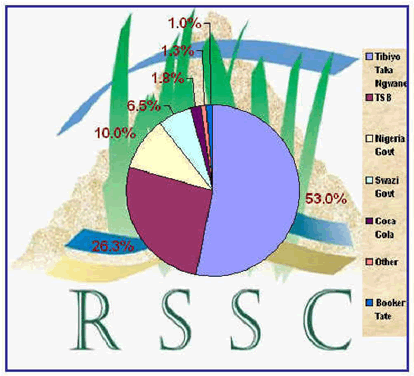 Royal Swaziland Sugar Corporation Limited (RSSC)
Royal Swaziland Sugar Corporation Limited (RSSC)
All data are collected in the Fiscal Year of 2008-2009.
Company Profile and History
The RSSC is one of the largest companies in Swaziland. Listed on the Swaziland Stock Exchange in 1992, RSSC is owned by several hundred shareholders. RSSC manages approximately 15,607 hectares of irrigated sugar cane on two estates leased from the Swazi Nation and manages a further 5 011 hectares on behalf of third parties, delivering approximately 2.3 million tonnes of cane per season to the Group’s two sugar mills. These two mills currently crush cane at a combined throughput of 700 tonnes per hour, producing approximately 430,000 tonnes of sugar (96o Pol) per season. RSSC also operates a sugar refinery, situated at the Mhlume mill, which produces 150,000 tonnes of refined sugar, and a 32 million litre capacity ethanol plant, which is situated adjacent to the Simunye mill. The Mhlume estate and mill, founded in 1958, are jointly owned by CDC Group plc and Tibiyo Taka Ngwane (the largest shareholder in RSSC), the latter in trust for the Swazi nation.
RSSC plays a significant role in the development of rural Swaziland, with over 2,500 families currently involved in sugar cane production as small-scale farmers who deliver to its two mills. From a land area measuring 11,356 hectares, they produce 1.2 million tonnes of sugar cane and supply 52.0% of the Mhlume mill’s total cane and 25.0% of the Simunye mill’s total cane. By March 2008, more than 3,095 hectares of cane had been developed by small-holder farmers in the Komati Basin, under the auspices of the Swaziland Water and Agricultural Development Enterprise (Proprietary) Limited (SWADE).
RSSC provides and manages housing and all related infrastructure for its employees and their dependants, in the estates’ various towns and villages. Apart from the Group’s direct employees, a further 20,000 people live on the estates.
In Country Location
Simunye Sugar Estate, Simunye, Swaziland;
Telephone: +268 313 4000
Telefax: +268 383 8171
Services and Products
The Company has two business units, agricultural and manufacturing with the latter divided into sugar and ethanol production lines. It operates over 20,000 hectare of irrigated sugar cane on two estates, delivering over two million tons of cane per season to its two sugar mills.
Number of Employees
3,000 people
Financial Information
RSSC’s profit after taxation for 2008 increased to E141.3 million, which represents an improvement of 39.1% on the previous year. Sugar production at 441,164 tonnes was up on the prior year’s figure of 434,911 tonnes. Ethanol production at 24.2 million litres was 165.9% up on the prior year’s figure of 9.1 million litres. Revenue increased to E1.6 billion due to a weakening of the local currency against both the US dollar and the Euro, as well as improved prices in the SACU, regional and world markets.

Market Share
RSSC is producing two-thirds of the country’s sugar
Business Objective
“RSSC will be a leading, world class, profitable, low cost producer and marketer of sugar, ethanol and related products for the benefit of all stakeholders. We will improve return on shareholder equity from 8.5% to 15% by 2011”
Business Model
The Swaziland Sugar Industry and RSSC continue to be in the five ‘low cost’ group of sugar producers in the world. In the context of an increasingly challenging market, RSSC seek to maintain its competitiveness through rationalisation, expansion, diversification and value adding activities so that it can lower its unit costs through economies of scale and achieve greater market presence as projects settle down to full operational capacity and profitability. The Group has renewed its efforts to maximise the utilisation of its assets, capitalise on new marketing opportunities, acquisition of and investments in allied business operations, further expansion in ethanol and sugar value added products and optimisation of financial and production performance.
Opportunities have been created with the structural changes in the EU and Swaziland is well positioned to use these to improve the value of its sugar products with regional and international marketing alliances.
Ownership of Business


Benefits Offered and Relations with Government
The Swazi Nation, through the smallholder farmers, the Swaziland Government and Tibiyo TakaNgwane (where the latter two hold shares in the milling companies, in trust for the Nation), has a major stake in the sustainability and growth of the industry.
The Swaziland Sugar Association (SSA) was formed in 1964 as an institution responsible for performing the services necessary for the general development of the industry and the marketing of Swaziland's sugar in particular. All sugar produced in Swaziland is, by law, sold through the SSA. RSSC continued to participate in the SSA structures to contribute to various marketing and strategic decisions.
SSA also provides technical services to assist the industry raise operational efficiencies, especially at the field level. This includes assisting smallholder cane growers working on Swaziland national land through training extension services and irrigation advice.
Product Development
The area under cane was approximately 20,908 hectares. A total of 2,248 hectares of replanting was carried out during 2008; a total of 494 hectares of furrow and sprinkler irrigated land was converted to sub-surface drip irrigation; an outgrower development department was established during 2008; the ongoing installation of sub-surface drip irrigation systems, at a cost of E13.0 million; the continuing work on increasing the storage capacity of the Mnjoli Dam, at a cost of E4.8 million; the replacement of ageing tractors, vehicles and machinery, at a cost of E3.7 million; the replanting of the first fields converted to drip irrigation over ten years ago was started; rehabilitation of the anhydrous plant to produce fuel grade ethanol was completed; expanding the Mhlume refinery by 30,000 tonnes in crop refining, from 120,000 tonnes to 150,000 tonnes per annum; following a motivation by RSSC to the national power utility company, the Simunye substation was successfully upgraded from 7.5 Mega Watts (MW) to 10.0 MW; and the construction of the first certified solid waste landfill is under way,




